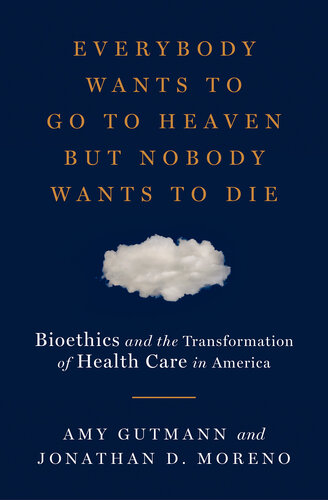
Everybody Wants to Go to Heaven but Nobody Wants to Die
Bioethics and the Transformation of Health Care in America
اخلاق زیستی و تحول مراقبتهای بهداشتی در آمریکا
کتاب های مرتبط
- اطلاعات
- نقد و بررسی
- دیدگاه کاربران
نقد و بررسی

May 13, 2019
Gutmann (The Spirit of Compromise, coauthor) and Moreno (Impromptu Man), who both served on President Obama’s bioethics commission, vividly explore the complexity of the ethical principles underlying scientific advances and emerging medical treatments. The opening chapters lay historic and cultural foundations, showing how debates over medical practices became more contentious as Americans became less automatically trusting of medical practitioners. Gutmann and Moreno then trace the evolving ethical debate by taking on wide-ranging questions, from the concrete—unequal availability of healthcare—to the abstract—the evolving definition of parenthood amid the proliferation of reproductive technologies. They also introduce the different ethical philosophies in play, the best-known of which is utilitarianism, but ensure the discussion remains immediate through real-life examples. These include the case of Brittany Maynard, a 29-year-old terminally ill cancer patient, whose “youth and vigorous advocacy” for her right to a physician-assisted death the authors credit with bringing new attention to the issue. Part cultural history, part philosophical enquiry, and part gentle polemic, this valuable survey should become prescribed reading for America’s healthcare practitioners.

May 1, 2019
In surveying the limitless ethical dilemmas created by modern medicine, University of Pennsylvania colleagues Gutman (The Spirit of Compromise) and Moreno (Ethics in Clinical Practice), both of whom served on President Obama's bioethics commission, trace the field from just after World War II, when the rapid advances in medicine and science that continue today began in earnest. Bioethics is inextricably linked, as they see it, to the politics of health care, and the book's overarching ethical question is how responsible we should be collectively for the well-being of others. The authors see providing basic affordable health care to everyone as a moral obligation but recognize the political and ideological barriers. They discuss specific areas that present individuals and society with ongoing ethical problems, including how we die, patients' rights and privacy, new reproductive technologies, human and animal experimentation, organ transplantation, the use of stem cells, and cloning. In each case they offer concrete examples of some difficult choices and how they are being addressed. The answers are seldom simple. VERDICT Targeting a general audience, this title provides a clear and compassionate presentation of complicated topics and how important it is to confront them. [See Prepub Alert, 2/4/19.]--Richard Maxwell, Porter Adventist Hosp. Lib., Denver
Copyright 2019 Library Journal, LLC Used with permission.

June 15, 2019
An analysis of how bioethics continue to affect modern American medicine. "All stages of our lives are caught up in challenging ethical questions raised by modern medicine, health care, public health, and life science research," write University of Pennsylvania president Gutmann (Identity in Democracy, 2003, etc.) and Moreno (Ethics/Univ. of Pennsylvania; Undue Risk: Secret State Experiments on Humans, 2016, etc.) in this astute examination of bioethics as it applies to America's collective health. As a primer to their insightful discussion, the authors share relevant personal stories. Gutmann discusses her beloved grandmother's conundrum involving a crucial medical decision, and Moreno discusses the blatant lack of clinical truth telling and "therapeutic privilege" at work during his mother's ordeal with cancer. These poignant memories illuminate the greater problem of ethics in medicine. The authors' three-part study begins with a comprehensive history of patient care as it progressed from an atmosphere of unquestioned physician opinion to more current viewpoints, where second opinions and collaborative clinical evaluations are more the norm. Gutmann and Moreno lucidly outline the differences between earlier eras in medicine, when a doctor's "implicit permission to mislead, if not to lie outright" was openly accepted, and contemporary medicine, where healthier food "choice architecture" and mental health system reforms are just two examples of the radical shift in perception and patient self-empowerment. The authors are unafraid to address more disputable, "slippery slope" issues, many of which remain targeted by polarized political systems. They also respectfully discuss the idea of universal health care, organ donor matching and transplantation, physician-assisted suicide, the surging interest in genetic manipulation, and the deep ethical issues surrounding the neuroscience field. While the authors agree that great strides have been made through more focused attention on ethical clinical care, America falls critically short on achieving a system that is both affordable and accessible. An academic, illuminating assessment of the past, present, and future forms of responsible public health care.
COPYRIGHT(2019) Kirkus Reviews, ALL RIGHTS RESERVED.

September 1, 2019
Human experimentation, gene therapy, vaccination, "snowflake babies," and physician-assisted suicide are a few of the hot-button topics addressed in this introduction to medical ethics. Gutmann and Moreno, who both served on the Presidential Commission for the Study of Bioethical Issues, sensibly examine the multitude of daunting challenges and difficult choices generated by America's current health care system?labeled by the authors as "inefficient and inequitable"?and by new technologies. They summarize the rise of bioethics along with changes in health care over the past 60 years and introduce the ethical principles of beneficence, justice, respect for autonomy, and nonmaleficence. They also cover the physician-patient relationship, truth telling, informed consent, and the limits of confidentiality. Organ transplantation, human embryonic stem cells, breakthroughs in neuroscience, universal health care, and mental illness ("the costliest condition in the United States") are discussed. A section focusing on reproductive issues is particularly well done. Medical advancements can engender ethical predicaments and a need to make hard choices. The authors wisely warn that "our scientific reach must not be allowed to exceed our moral grasp."(Reprinted with permission of Booklist, copyright 2019, American Library Association.)

























دیدگاه کاربران